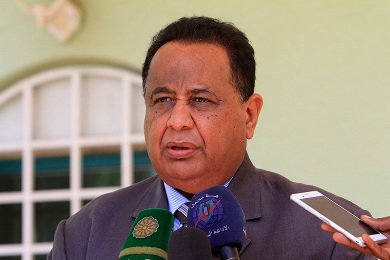Mentioning Ethiopia’s reservation over 1959 water deal caused failure of Khartoum meeting
April 14, 2018 (KHARTOUM) – A small issue about whether or not to mention Ethiopia’s reservation on the 1959 agreement caused the failure of Khartoum meeting over Grand Ethiopian Renaissance Dam (GERD), said Sudan’s Foreign Minister Ibrahim Ghandour on Saturday.

The Sudanese top diplomat in another interview with the Egyptian official newspaper Al-Ahram gave more details on what happened on Khartoum meeting saying the meeting was constructive and the three delegations reached an understanding over all the outstanding matters, except a small point about the 1959 deal.
He added all the parties have agreed not to include it in the discussion over the GERD, but the difference emerged when Ethiopia wanted it to be clearly written in the outcome of the meeting and Egypt wanted it to remain a gentleman agreement.
“The small point of disagreement at the Khartoum meeting is related to Ethiopia’s reservation on the Nile Water Agreement between Egypt and Sudan. All of us have accepted it, but some refused to sign (a document stating the acceptance of this reservation) saying they agree on it but do not want to see a written text about it, while another party said it should be written as long as we agreed on it,” said Ghandour.
“This little difference on writing a (formal) agreement or only to have it as a Gentleman agreement is what led us to where we are, but I think it is a small point of disagreement,” he emphasized.
In a separate statement to the press in Saudi Arabia, Ghandour said the three countries agreed that “no one would be harmed by the dam”.
The other Nile Basin countries including Burundi, Democratic Republic of Congo, Kenya, Rwanda, Tanzania and Uganda together with Ethiopia in the past said they want to negotiate all the treaties on the Nile water, particularly 1929 Nile Waters Agreement.
Signed on 7 May 1929 between Egypt and Great Britain, the deal gives Cairo the right to veto projects on the Nile that would affect its water share. At the time, London represented Uganda, Kenya, Tanzania and Sudan.
The 1959 agreement between Egypt and Sudan, which is seen as a complement to the 1929 agreement, gave Egypt the right to 55.5 billion cubic meters of Nile water and Sudan 18.5 billion cubic meters per year.
Last Thursday, Egypt’s Foreign Minister Sameh Shoukry said that his country had invited Ethiopia and Sudan to resume the GERD negotiations on April 20.
(ST)
